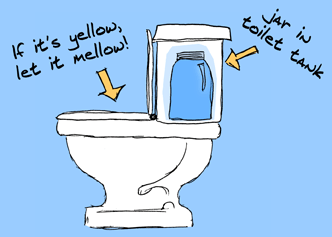 Practical ways to reduce the load on our wastewater treatment plant
Practical ways to reduce the load on our wastewater treatment plant
For many years, Thunder Bay has had an effective water conservation program to encourage people to use less of our municipal water supply. In the community’s current state of emergency, the emphasis needs to switch to reducing the amount of water that goes down the drain into the sewage treatment system. All businesses and households contribute wastewater to the system, therefore it is necessary for all to participate in the efforts to reduce loads on the system. Please do what you can, keeping the following tips in mind:
Bathing and Showering
- The preferred option is to bathe with a sponge or washcloth, using a basin of water. If a shower is necessary, try a military style shower (rinse, turn off the water while you soap and shampoo, turn water back on again to rinse quickly), or use a 5-minute shower timer (available free at EcoSuperior, 562 Red River Road)
- Worried about not shampooing your hair? Put it up, wear a hat, or try a dry shampoo (cornstarch or baking soda work well—rub into oily areas and brush out)
- When brushing your teeth, use a glass of water instead of letting the tap run
Toilet
- Avoid unnecessary flushing—don’t use for disposing of tissue etc. Go by the cottager’s creed: “if it’s yellow, let it mellow; if it’s brown, flush it down.”
- If you have more than one toilet in the house, use the one with the lowest flush volume
Hand washing
- Fill a small basin to keep for hand washing instead of running water. If you are concerned about germs, follow up with an alcohol based hand sanitizer.
- If you are running the tap waiting for hot water, catch the running water in a bucket to use for other purposes
Kitchen
- When you boil pasta, potatoes or vegetables, save the cooking water in a bucket to use for your plants
- Avoid running water for a glass of drinking water. Fill a jug and keep it in the fridge so it is ready to serve
- Washing dishes by hand in a basin (not under running water) uses less water than a dishwasher.
Other
- If you have a water softener, consider turning it off until the city’s situation improves. Softeners are on a regular flush cycle that sends a lot of water down the drain
- If you have a leaky toilet, shut it off when not in use
- If you have leaky faucets, put a bucket under it and empty it outside, until you can get the leak fixed properly
- Please be considerate: put off doing your laundry and washing your car for the next few days.

For further information, please contact Ellen Mortfield, Executive Director, EcoSuperior Environmental Programs Ellen@ecosuperior.org













